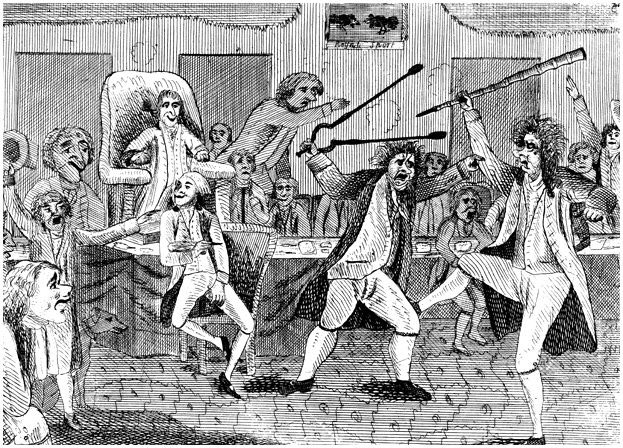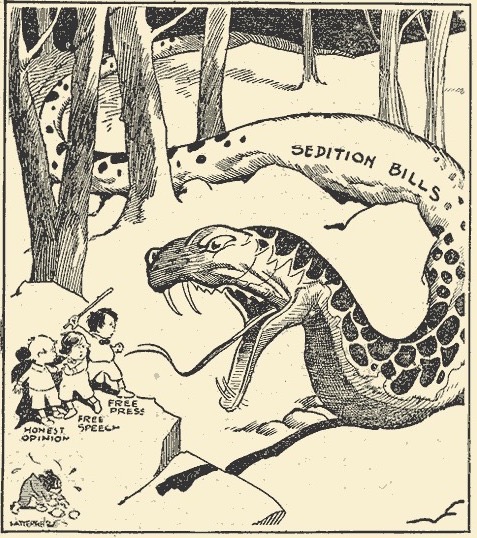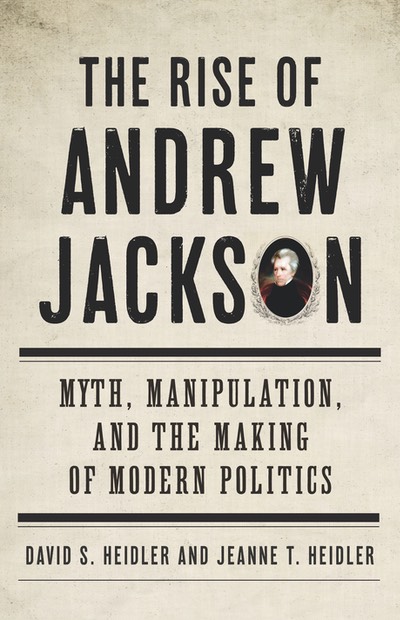It has before. It is now.
Luther Baldwin was in every way an uninteresting man, but nine words he uttered in jest one July afternoon in a New Jersey tavern made him famous. Baldwin and a couple of friends were sipping on pints as a cheering crowd lined Trenton’s streets to watch John and Abigail Adams pass through town. Bells rang and a cannon loaded with powder and wadding fired some harmless reports while the President’s carriage rattled down Broad Street. Inspired by the noise, one of Baldwin’s companions blurted out, “There goes the President and they are firing at his arse!” Baldwin merrily exclaimed, “I don’t care if they fired through his arse!”
Those nine words were likely the funniest thing Luther Baldwin ever said. It was not quite Falstaff, but it was typical talk for taverns in late eighteenth century America. All in good fun, as they say. At least until someone gets arrested. For this was the summer of 1798, and Luther Baldwin was about to find himself in a great deal of trouble. So were the two unlucky barflies with him, one of whom had apparently said nothing and thus had done nothing wrong other than be in the company of someone who had broken a federal law by opening his mouth.
This small detail didn't matter to a vigilant government whose cabinet secretaries spent their nights combing newspapers for potential prosecutions. In a few weeks, Baldwin and friends would find themselves before an associate justice of the United States Supreme Court where they would be indicted by a grand jury for uttering “seditious words to defame the President of the United States.”
The following spring Baldwin stood trial before another Supreme Court justice, Bushrod Washington (George Washington’s nephew). Baldwin was convicted and fined $150, a fortune for a fellow who made his living at the helm of a Passaic River garbage scow. Baldwin didn’t have the money. He was thrown in jail until he could come up with it, which is to say he was thrown in jail, period.
The law that landed Luther Baldwin in a New Jersey prison was the Sedition Act of 1798. We might pause here to note that it was a mere fifteen years after the American Revolution that the United States Congress passed legislation to lock up citizens for speaking their minds. As incredible as that seems, even more incredible was the President who signed it and committed the executive branch to its enforcement. Federal courts likewise agreed to hear cases and pass judgment on people for exercising a right specifically protected by the Constitution. In the two years that followed, more than two dozen Americans had their freedom of speech dismantled for brazenly political purposes.
Despite the emergency that purportedly inspired the law, it was really meant to silence dissent. Luther Baldwin was not a criminal. He was an example, a cautionary tale in the flesh, a man in lockup for making a joke, or more accurately, the wrong kind of joke.
The Constitution was supposed to be a sentinel protecting free speech, but it became a silent sentinel in the hands of men who should have known better. During the American Revolution, John Adams the patriot embraced the right of free speech, and many who sat in Congress took extraordinary risks to secure it. In 1798, Congress seemingly forgot the reason for the risks, and John Adams as President apparently lost his appreciation for the right to criticize government.
To be sure, nobody gives up his freedom for a bad cause, and a national emergency can convince even the most thoughtful men to do thoughtless things. In 1798, Americans thought they had just such an emergency. They were clashing with France on the high seas, a direct result of the war between revolutionary France and Great Britain. The Unites States desperately sought neutrality through diplomatic agreements with Britain and overtures to the French government, but Paris not only rebuffed American proffers. The French demanded bribes as a condition for talks. The American people were enraged, and Congress prepared for war. Dealing with presumably disloyal elements at home was one of the first orders of business.
In the summer of 1798 Congress passed and President Adams signed into law a measure to prevent domestic subversion, which they defined as opposition to the policies of the majority Federalist Party. The Sedition Act was odious in every way. Under it, anyone who had the temerity to “write, print, utter, or publish . . . any false, scandalous and malicious writing or writings against the government of the United States, or either house of the Congress . . . or the President of the United States” was committing a high misdemeanor punishable by fine, imprisonment, or both. Under this broad construction, the law altered the basic tradition of American (and English) jurisprudence by giving its enforcers capricious power to make illegal that which they found distasteful.
With good reason, Thomas Jefferson called what followed “the reign of witches.” After targeting the boozy Baldwin, the government set its sights on larger and more serious game. William Duane, editor of the Philadelphia Aurora, was brought before the bench for actively supporting Republicans in the election of 1800. The Northumberland Gazette in Pennsylvania said that John Adams was an enemy of liberty, earning editor Thomas Cooper a six-month sentence and a $400 fine, while in New York William Durrell fared slightly better (four months and $50) because he had merely reprinted an “offensive” article in his Mount Pleasant Register.
As Baldwin's ordeal showed, however, journalists were not the only quarry. David Brown and friends raised a liberty pole in Dedham, Massachusetts, sporting such incendiary messages as wishing the defeat of tyrants, the peaceful retirement of Adams, and that “moral virtue be the basis of civil government.” The case against Brown was especially revolting because his actions emulated America’s revolutionary patriots in word and deed, but his sentence’s severity was even more shocking—a whopping $400 fine and almost two years in jail. It also remains shocking for this reason: Brown would not provide the names of people who had helped him put up the liberty pole. For that bit of cheeky resistance, John Adams refused to let Brown out of prison even after the presumed threat to national security had long passed.
Persecuting newspaper scribblers and latter day Sons of Liberty was bad enough, but defenders of the Sedition Act could at least trot out the need for collective security trumping the rights of a few rabble-rousers. The victimization of Matthew Lyon, however, exposed the law’s darkest purpose.
During debates over the sedition bill, Lyon, the Republican representative for Vermont's 1st District, predicted that it could be used to punish members of Congress who disagreed with the President. Federalists scoffed at the claim. They pledged that as long as the President’s opponents did not lace their criticisms with lies, no magistrate could molest them and no court would convict them.

Federalists despised Matthew Lyon for his sharp tongue and skill in using it to lash the Adams administration. In February 1798 during debates in the House of Representatives, Federalist Roger Griswold disparaged Lyon’s Revolutionary War service. Lyon spat on him, and a violent confrontation ensued. Lyon’s friends dubbed him “the Spitting Lyon,” but Federalists singled him out for personal and political destruction under the Sedition Act.
This assurance was the real lie, though, as Congressmen Lyon found out. In the off-year election for his seat, Federalists both in and beyond Vermont condemned him in newspapers for undermining the Adams administration. The provocative charge that Lyon was a disloyal subversive was a cynical tactic to bait a touchy man. He took up his pen to say that he could not support Adams while “every consideration of the public welfare [was] swallowed up in a continual grasp for power, in an unbounded thirst for ridiculous pomp, foolish adulation, or selfish avarice.” Those words became the first count in Lyon’s indictment, handed down just weeks before the election, charging him with defaming the President to incite sedition.
Ensuing events were worthy of a Franz Kafka novel. Lyon lived on the Vermont frontier, a place happily lacking lawyers, which was cheerful until you needed one. Incredibly Lyon had to hire his election opponent to represent him. When Lyon insisted that a man’s opinion was beyond the reach of any law and that any law that said otherwise was unconstitutional, the judge silenced him and instructed the jury to ignore the claim. Said jury returned a guilty verdict in one hour, and the judge sentenced Lyon to four months in jail. He was also to remit court costs and pay $1000 in fines. Matthew Lyon was then thrown into an unheated cell frozen by the Vermont winter.
They could lock up Matthew Lyon, but they could not shut him up. He continued his campaign for Congress from jail and won reelection with a larger majority than he had two years earlier. His constituents petitioned President Adams for a pardon, but Adams sniffed that Lyon had not personally asked for it nor expressed contrition for his actions. The government kept him under lock and key for his entire sentence. When Vermont journalist Anthony Haswell had the temerity to celebrate Lyon’s triumphal return to freedom, he too was thrown in jail for sedition, the latest victim of a country made wretched by the reign of witches.
Historians willing to defend Adams, Congress, and the courts, if not these appalling prosecutions, point to the low number of cases as proof that no real harm was intended or happened. It is as if the government’s plucking twenty-five men to serve up as victims to a disgusting law is evidence of tolerable restraint. Yet like Luther Baldwin at the beginning and the others to follow, these men were made criminals to make them examples. The British did not kill a dozen fleet officers after losing Minorca but only Admiral John Byng, “pour encourager les autres.”
The ordeal of these people made them symbols of an evil larger than their individual circumstances, larger even than the intentions of their persecutors, because the petty goal of gaining political supremacy can too easily take on the monstrous trappings of vicious retribution. There is a natural tendency of governments to insulate themselves with such devices as sedition laws. Tudor England bowed before Henry VIII enforcing religious conformity centuries before America’s Sedition Act. A century after it, Woodrow Wilson responded to World War I by throwing dissenters into jail. In our own time Congress contemplates significant curbs on speech that would gut the First Amendment. American colleges and universities, purported bastions of boundless intellectual inquiry, have established speech codes that muzzle debate and quash freedom of expression under the guise of barring “hate speech” or to address trifling claims that speech should be barred if it is merely deemed “offensive."

Woodrow Wilson, Congress, and the courts teamed up in 1918 to use their own Sedition Act to prosecute Americans for criticizing the government with “abusive language,” a purpose so vile and a standard so subjective that it made this editorial cartoon an appropriately terrifying depiction of the policy's consequences.
Thomas More’s dank cell in the Tower of London, Matthew Lyon’s frigid one in Vergennes township, and Tommy Robinson’s current nine-month jail sentence in the UK are all instances of people under the hard hand of the state, not because of what they have done but because of what they think, and what they say. Financial ruin and dungeons are the weapons of the powerful at the ugly business of coercing a person to violate his conscience. Violent mobs intimidating and accosting journalists are a means to a hideous end. Algorithms that decide what is right and wrong in policing the internet are the technological version of Ring Lardner’s terse response — Shut up,” he explained — and becomes an acceptable way of dealing with the discomfiting question.
In 1798, people with a living memory of the American Revolution and cautious about creeping despotism were not repelled by sedition trials. The law lasted, trials took place in the spring and early summer of 1800, and men went to jail, some to languish there for months. And at the beginning through the end, the actual motive distilled, as it always does, to nothing more than the despicable creed of authoritarians everywhere: “Because we can.”
And do not doubt it for a moment. Given the means, they will.
They already are.



